How to Stop Rats and Mice from Infesting Your Home and Garden
Rats and mice are small rodents that can be a serious problem in both home and garden. They can gnaw through important wires in your home or dig in your beautiful garden that you have put a lot of effort into creating.
When these critters are left uncontrolled, their population can get worse. Thus, it's important to take action to get rid of them. In this guide, we'll look at different methods of rat and mouse control. Continue reading to learn more.
Disclosure: This post contains affiliate links. We may receive commissions on purchases made from our chosen links with no extra cost to you. Learn more.
Set a Trap
Traps are designed to capture or exterminate rodents. Common types of traps include snap traps, live traps, glue traps, and electronic traps. All these are effective to get rid of rats and mice but the one to choose will depend on your personal preferences and priorities.
For instance, if you want to catch a rat or mouse without harming it, one option is to use a live trap. You can then release it in a wooded area. But to use live traps, you must firstly check with your local extension office before setting it.
Note: If you decide to use a snap trap, do not set it in areas where people or pets walk.
Use peppermint oil
Peppermint oil is one of the natural repellents you can use to get rid of rats and mice. It is also effective against many different pests such as spiders, flies, mosquitoes, and all other kinds of rodents. Peppermint oil works by overwhelming the sense of smell for pests which makes them avoid the areas where it has been applied.
You can use peppermint oil in various ways such as dousing cotton balls with the oil and putting them in areas where rodents are likely to enter your home. But one of the simple yet effective ways that I like is using ready-to-use repellent balls that contain peppermint. You can find them in your local home & garden or online.
Note: Peppermint oil is an effective way to repel rodents, but it should be used in combination with a trap method for optimal results
Get a Cat
Getting a cat to keep the rats and mice population under control is a great move. Cats are well-known predators of these small rodents. Although they're excellent hunters of rodents, the only downside of cats is that they can dig up your plants and destroy your beautiful garden, or use your garden as a litter box.
But you can prevent this from happening by putting more litter boxes around your home and teaching your cat to use them. Then to stop cats from engaging in destructive behaviour, keep them occupied during the day since they usually hunt at dusk and dawn when night their prey is most active. You can try to provide them with toys or scratching posts to help them keep occupied.
Block Entry Points
Mice and rats fit through some unbelievable openings. Therefore it's very important to seal any crack or hole around your home. Some common places which they might use as an entry point is along the foundation, around doors and windows, and underneath overhangs and eaves.
There are different things you can use to seal cracks, holes, or any gap in your home and every option will depend on the size and location of the cracks or holes you want to seal. For example, if you're dealing with cracks in your foundation, you can use hydraulic cement, but you can't use it to seal doors. For sealing wooden items like doors, you can use expanding foam.
Tidy Your Home’s Surroundings.
Untidy homes attract rodents and other pests. So one of the important steps to take in eliminating these small critters is to make your home less hospitable to them. What's even more important is that if you keep the area around your home tidy, it reduces the risk of rats and mice getting indoors.
Reduce the amount of clutter in your home and clear away piles of leaves and any unwanted materials that could serve as a shelter for rodents. If you have a woodpile, make it less appealing to pests so they can not hide and breed. In addition, always keep your trash sealed.
There are dozens, if not hundreds of places where these critters could potentially hide. So make it a habit to regularly check for signs of activity of these pesky rodents rather than waiting to see them physically. Two common signs are the presence of droppings and chewed materials.
Don't Use Rat Poison
While many people use rat poison to knock down the population of rats and mice, I do not recommend using it. First of all, rodenticides are indiscriminate. They can kill other beneficial animals including your pets.
Plus the poison doesn't act instantly so the rats die elsewhere. It may die inside the walls or even in hard-to-reach areas. This can create more problems than solutions as you'll spend more time trying to figure out where the unpleasant smell is coming from. Sometimes even if you identify the area that has the strongest smell, it may be difficult to pinpoint the exact source.
Hire a pest control company
If you're dealing with a serious problem of these critters, or if you have less time to focus on eliminating them, you can consider hiring a professional pest control company. But keep in mind that professional pest control can cost an arm and a leg. So if you're on a tight budget, you can stick to the above-mentioned options.
To Conclude
Rats and mice can cause serious damage to your garden or property, but if you take steps to get rid of them, you can have a rodent-free environment. For a successful outcome, you should try to use a combination of these methods rather than relying on just one method.
RELATED
How to Get Rid of Chipmunks and Squirrels
How to Get Rid of Moles, Voles, and Gophers
How to Get Rid of Skunks, Racoons & Opossums
Effective Ways to Get Rid of Groundhogs (Woodchucks)
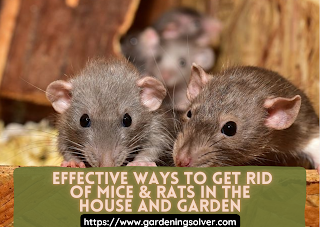
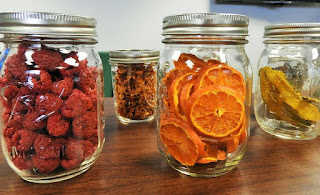
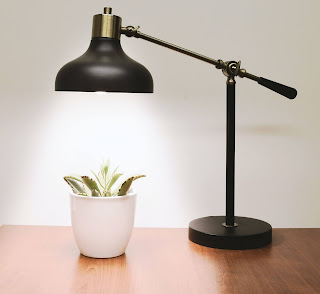


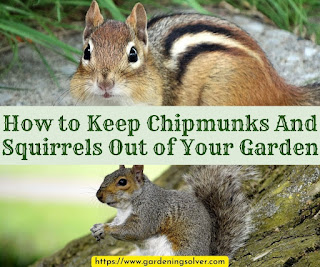
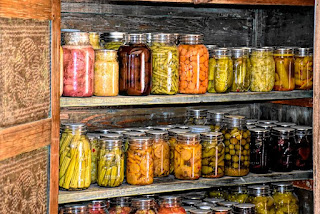
Comments
Post a Comment
Have something to say? Feel free to leave a comment.